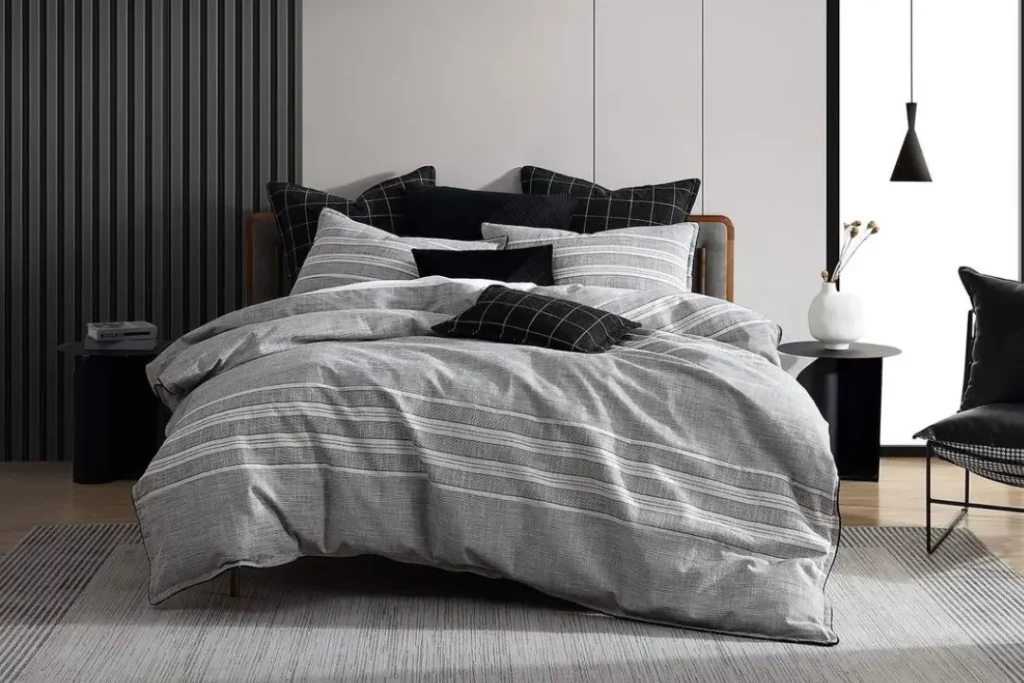As its name suggests, a quilt cover is a material used to cover a quilt. It protects the quilt from dust mites, allergens, body oils, and stains that can cause potential damage. You can think of it as a giant pillowcase, the only difference is that it covers the quilt.
Quilt covers are made from various materials, including wool, cotton, cotton sateen, polyester, silk, and linen. Quilt covers usually come with matching pillowcases to complete the look.
What are quilt covers made of?
There are a wide variety of quilt covers on the market, each of which comes in standard sizes and is made from different materials such as wool, cotton, cotton sateen, polyester, silk, and linen, among others.
Quilt covers are most commonly made from cotton or linen since they are durable, affordable, and breathable. Quilt covers made of silk are also very popular, though super expensive. Polyblend quilt covers are a good choice for those seeking a cheap, yet high-quality quilt cover.
Benefits of using a quilt cover
You can benefit a lot from having a quilt cover. Here are some benefits you will get from using a quilt cover.
- Quilt covers enhance the warmth and make quilts more comfortable.
- They extend the lifespan of the quilt by protecting it from shredding or being torn apart.
- Quilt covers prevent your quilt from being ruined by sweat, body oil, or other stains.
- Quilt covers are decorative, so they add a touch of style to your bed.
- Unlike quilts, quilt covers are machine-washable and easy to dry.
- Quilt covers can be used as duvets during summer.
- You can also use quilt covers as duvet and comforter covers.
A guide to choosing a quilt cover

There are some things you need to consider before buying a quilt cover. For example, the fabric quality, and cost of the quilt cover. There are other things that matter as well. You need to keep the following factors in mind when making your purchase:
Fabric
You should choose a quilt cover made from high-quality material. Another factor to consider is ease of use. Some fabrics, such as silk, require delicate care, while others, such as cotton or microfiber, are wrinkle-proof and easy to maintain.
Size
In order for the quilt to fit perfectly, the quilt cover must be the same size as the quilt. So when purchasing, make sure you select the right size.
Sleeping habit
Don’t forget to consider your sleeping habit as well. If you are a hot sleeper, cotton or linen is a good choice, while those who need extra warmth should look for silk or synthetic materials.
Thread Count
Whenever you buy a quilt cover, make sure that you choose one with a higher thread count. Generally speaking, sheets with a high thread count, between 400 and 600, are of a higher quality and more durable.
Cost
Price is the most important factor since which quilt cover is best for you depends entirely on your budget.
In general, quilt covers vary in price depending on the material – covers made of synthetic fiber are cheap and budget-friendly, whereas those made of silk are the most expensive.
FAQs
Can You Use a Quilt Without a Cover?
Yes, you can use a quilt without a cover, but it is recommended to use one. Quilt covers protect your quilt from dust, stains, and physical damage. Also, covers are easier to clean and maintain, which contributes to a healthier sleeping environment.
Can you sleep with just a quilt cover?
Yes, you can sleep with just a quilt cover, in the absence of a quilt insert, especially on hot nights.
What is included in a quilt cover set?
A quilt cover set typically includes a quilt cover and two matching pillowcases.
Are quilt covers the same as doona covers?
yes, a quilt cover is the same as a doona cover or a duvet cover.
Can duvet covers be used as quilt covers?
Yes, there is no difference between a duvet cover and a quilt cover. They are both the same.
Leave a Reply